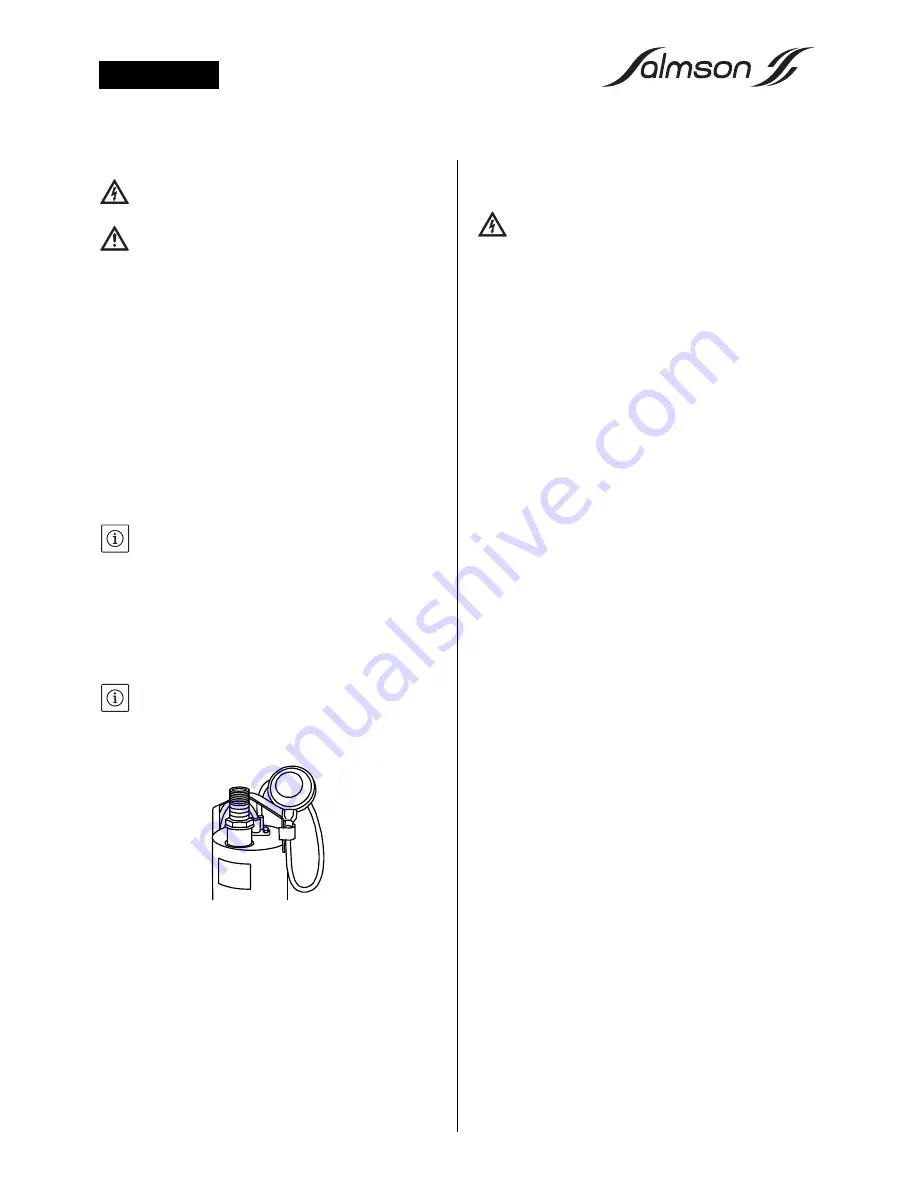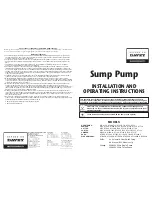
14
ENGLISH
8. COMMISSIONING
Danger! Danger through electric shock!
The pump may not be used to drain swimming pools /
garden ponds or similar place if anyone is in the water.
CAUTION! Danger of property damage!
Do not allow the mechanical seal to run dry!
Dry running shortens the service life of the motor and
the mechanical seal. If the mechanical seal is dam-
aged, small amounts of oil may escape into the
pumped fluid.
•When filling the shaft or lowering the pump into the pit, make
sure that the float switches can move freely. The switch must
switch off the pump before the intake openings of the pump
can draw in air.
•After filling the shaft and opening the check valve on the pres-
sure side (if provided), the pump starts up automatically when
the switch-on level 'h' is reached and switches off as soon as
the switch-off level 'h1' responds.
•Do not point the water jet entering the shaft at the pump
strainer. Entrained air can prevent the pumping of the pump
when it is starting up.
•The maximum volume of water entering the shaft must not
exceed the performance of the pump. Keep an eye on the
shaft when commissioning the pump.
NOTE: The venting of the pump when commissioned for
the first time will be improved by submersion in the fluid
at an angle or by positioning it at a slight angle.
Adjusting the switching level of the float switch
The perfect functioning of the level control system is guaran-
teed if the details according to the table in 7.1 and
FIG. 2
are
observed.
The switching level (switch-on/off point) can be changed via
the free float switch cable by moving the cable within the clip
on the pump handle.
NOTE: In order not to damage the float switch cable
when adjusting the level, the clip has to be released.
If necessary, by pegging the float switch in a higher position, a
drainage level of up to approximately 18 mm
can be
achieved.
To do this, release the float switch clip on the pump handle.
Raise the float switch in relation to the handle and, working in
the opposite direction, fix the cable, as close to the switch as
possible, on the handle again with the aid of the clip. The auto-
matic system is then switched off and the pump runs continu-
ously.
An automatic operation can also be achieved with the aid of
switchgear from the accessories range.
9. MAINTENANCE
Maintenance and repairs may only be carried out by qualified
experts!
DANGER! Risk of fatal injury!
There is a mortal danger through shock when working
on electrical equipment.
•Before any maintenance and repair work, the pump
must be switched off and prevented from being
switched on again in an unauthorised manner.
•Damage to the connecting cable may only be repaired
by a qualified electrical contractor in principle.
•When checking the function following long downtimes,
avoid contact with the fluid.
In order to prevent blockage of the pump resulting from long
downtimes, its ability to function should be checked at regular
intervals (every 2 months) by manual raising of the float switch
or direct switching-on and brief start-up of the pump.
Minor wear of the rotary shaft seal and mechanical seal can
lead to fouling of the liquid following an oil leak from the oil
chamber, which is filled with medical white oil.
Only specialist companies or
Salmson After-sales Service may
open the encapsulated motor.
Cleaning the pump
Depending on the use of the pump, fouling can occur within
the suction strainer and the impeller. Rinse off he pump under
running water after use.
1 Switch off the power supply. Disconnect the mains plug.
2 Drain the pump
3 The suction strainer is bolted to the pump housing. Undo the
2 screws on the suction strainer with a suitable screwdriver
and remove the suction strainer.
4 Clean the suction strainer under running water.
5 Undo the 4 screws on the bottom part of the pump housing
and remove the housing. Handle the O-ring between the
pump housing and motor housing carefully.
6 Clean the impeller and pump housing under running water.
The impeller must turn freely.
7 Replace damaged or worn parts with original spares.
8 Re-assembly the pump in the reverse order.













































